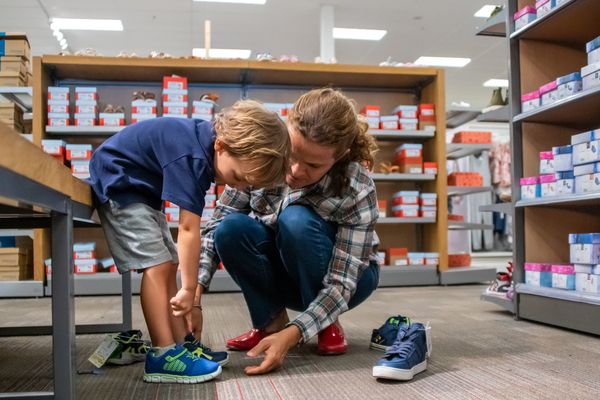Shoe retailer DSW (DSW +2.38%) is counting on acquisitions to change its direction. CEO Roger Rawlins says, "what got us here won't get us there," meaning the business needs to do more than sell shoes. When it closed on its Camuto Group purchase last month, DSW entered the brave new world of manufacturing.
Yet DSW's acquisition track record leaves something to be desired, and after what has been largely a good year of getting back on track, going off on a tangent like this could cause it to stumble. With the retailer-now-manufacturer set to report third-quarter earnings on Tuesday, Dec. 11, investors will be looking for any insight management can give on the new acquisition and how the deal to acquire all of Town Shoes that it closed earlier this year is shaping up after it decided to close that company's mall-based Town Shoes banner.

Image source: Getty Images.
Shoot first, ask questions later
DSW has certainly faced -- and overcome -- its share of adversity due to a tough retail marketplace and a challenging e-commerce environment. Its results so far this year saw it really hit the ground running, growing net sales, comparables, and profits, though not always as much as it -- or the markets -- wanted.
Yet many of the improvements came about after DSW made some acquisitions seemingly without fully thinking through the implications of the purchase. For example, it was DSW's decision to close down its Ebuys business that helped boost gross margins last quarter. Ebuys was a digital off-price footwear and accessories retailer that DSW bought back in 2016 for $62.5 million, but it decided to exit the business a little over a year later.
The rationale behind the original purchase was to give DSW a material boost in the e-commerce space as well as exposure to overseas markets. DSW ended up writing down the value of the business by some $52.7 million, meaning it wildly overpaid for it.
Earlier this year, DSW finally completed the purchase of Canadian shoe retailer Town Shoes. Although DSW has had a sizable stake in the business since 2014 and presumably performed due diligence prior to acquiring the rest of the business it didn't already own, it engaged in a top-to-bottom review of its operations after the acquisition and decided the namesake chain lost too much money and would need to have all 38 stores closed.
That acquisition was based on furthering its business in Canada, and though DSW will still be operating Town Shoe's Shoe Warehouse, Shoe Company, and DSW/Designer Shoe Warehouse concepts, it seems that having insight into the business for so long should have allowed it to know the chain was not a viable fit beforehand. The decision inflated some expenses last quarter, though they will be one-time in nature.
Still fleet of foot
Now DSW has bought Camuto Group, a troubled footwear designer and manufacturer that flubbed an acquisition last year when negotiations with Aldo Group were abruptly cancelled after three months. The rationale given by DSW for making the purchase is that it will give it global production, sourcing, and design infrastructure, as well as introduce the retailer to new foreign markets.
That's not unlike why it bought Ebuys -- or Town Shoes, for that matter -- but this purchase introduces a whole new level of risk for the retailer, since being a manufacturer is a very different business than being a retailer. DSW is paying $57 million for a 40% stake in the intellectual property of Camuto Group's proprietary brands and $181 million for Camuto Group's operations.
Fortunately, DSW does still have what looks to be an otherwise sound business. Sales jumped 16.4% to $795 million in the second quarter as comps increased 9.7%, and its 25 million-member loyalty program continues to offer returns on customer retention and growth. Management also raised full-year guidance last quarter to between $1.60 and $1.75 per share.
DSW's prior acquisitions are small compared to its latest purchase, and their impact will be fleeting in relation to the marked change in direction it is now taking. Investors will need to keep an eye on the impact as DSW integrates the business into its own operations to see how branching out into manufacturing will affect its bottom line.






